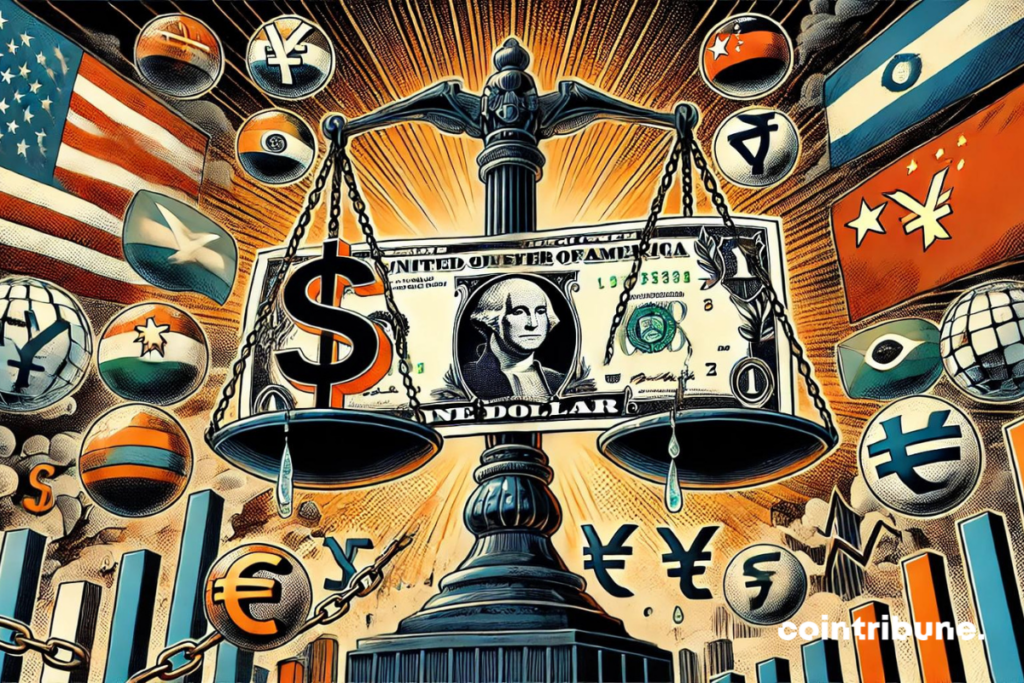The BRICS Fail To Weaken The US Dollar
De-dollarization, a major ambition of the BRICS, has just suffered an unexpected setback. Despite years of concerted efforts to erode the dominance of the US dollar, a new report from the Atlantic Council reveals that these initiatives have failed to seriously threaten the supremacy of the greenback. This unexpected finding calls into question the viability of the BRICS economic strategies.

Atlantic Council Report: A Deadlock for BRICS De-dollarization
The Atlantic Council GeoEconomics Center’s report unveiled surprising results on the BRICS’ de-dollarization efforts. Despite ambitious initiatives to reduce global dependence on the US dollar, these efforts have not produced the desired effects. “The dollar continues to dominate foreign exchange reserves, trade transactions, and global currency exchanges,” indicates the report. Indeed, the data shows that the dollar still accounts for 58% of global reserves, while the euro, in second place, represents 21%.
The BRICS had implemented several strategies to challenge the dollar’s dominance, including the creation of new cross-border payment systems. However, these initiatives are still in their early stages and face significant challenges in terms of regulation and liquidity. The report also highlights that “all potential rivals, including the euro, have limited capacity to challenge the dollar in the short term.”
In conclusion, although the BRICS have taken notable steps to promote the use of local currencies in international trade, the impact of these measures remains limited. The US dollar maintains its dominant position, and the BRICS’ efforts to restructure the global monetary landscape seem to encounter major obstacles that hinder their progress.
Limits and Challenges of BRICS De-dollarization
The Atlantic Council report emphasizes that despite some bilateral agreements in local currencies, the share of these transactions is too negligible to seriously affect the supremacy of the dollar. In reality, the BRICS’ de-dollarization policies have had little or no effect on the dollar’s dominance, which continues to reign supreme in international trade and foreign exchange reserves.
The currencies of BRICS countries, such as the Chinese yuan and the Indian rupee, have experienced declines against the dollar, exacerbating the situation. Paradoxically, central banks in many countries have increased their dollar reserves rather than yuan this year, despite China’s sustained efforts to promote its currency.
The future prospects for the BRICS remain uncertain. The persistent dominance of the dollar could mean that more coordinated approaches and innovative solutions are necessary to truly compete with the American currency. The Atlantic Council report suggests that without a significant overhaul of current strategies, the BRICS’ efforts to reshape the global monetary landscape will remain limited.
Maximize your Cointribune experience with our "Read to Earn" program! For every article you read, earn points and access exclusive rewards. Sign up now and start earning benefits.
Diplômé de Sciences Po Toulouse et titulaire d'une certification consultant blockchain délivrée par Alyra, j'ai rejoint l'aventure Cointribune en 2019. Convaincu du potentiel de la blockchain pour transformer de nombreux secteurs de l'économie, j'ai pris l'engagement de sensibiliser et d'informer le grand public sur cet écosystème en constante évolution. Mon objectif est de permettre à chacun de mieux comprendre la blockchain et de saisir les opportunités qu'elle offre. Je m'efforce chaque jour de fournir une analyse objective de l'actualité, de décrypter les tendances du marché, de relayer les dernières innovations technologiques et de mettre en perspective les enjeux économiques et sociétaux de cette révolution en marche.
The views, thoughts, and opinions expressed in this article belong solely to the author, and should not be taken as investment advice. Do your own research before taking any investment decisions.